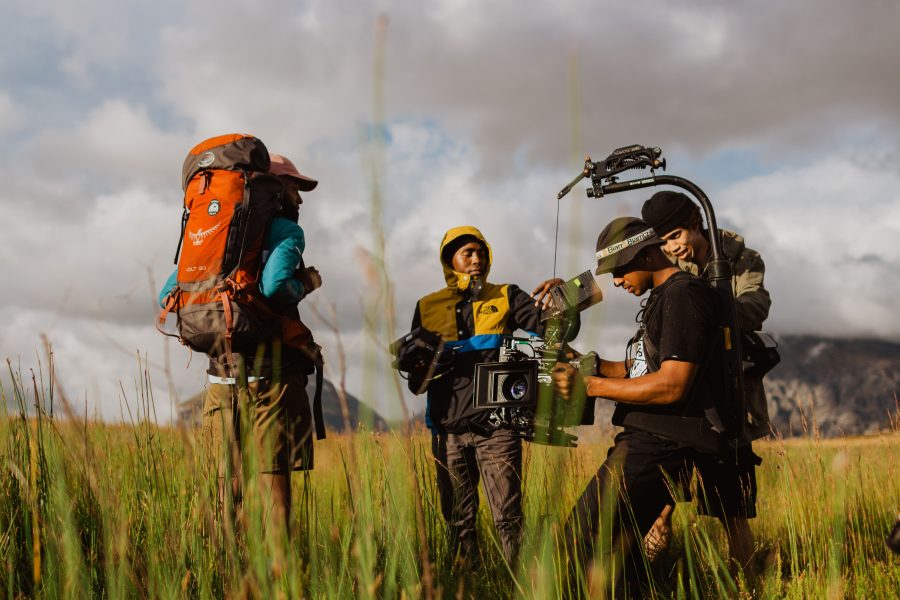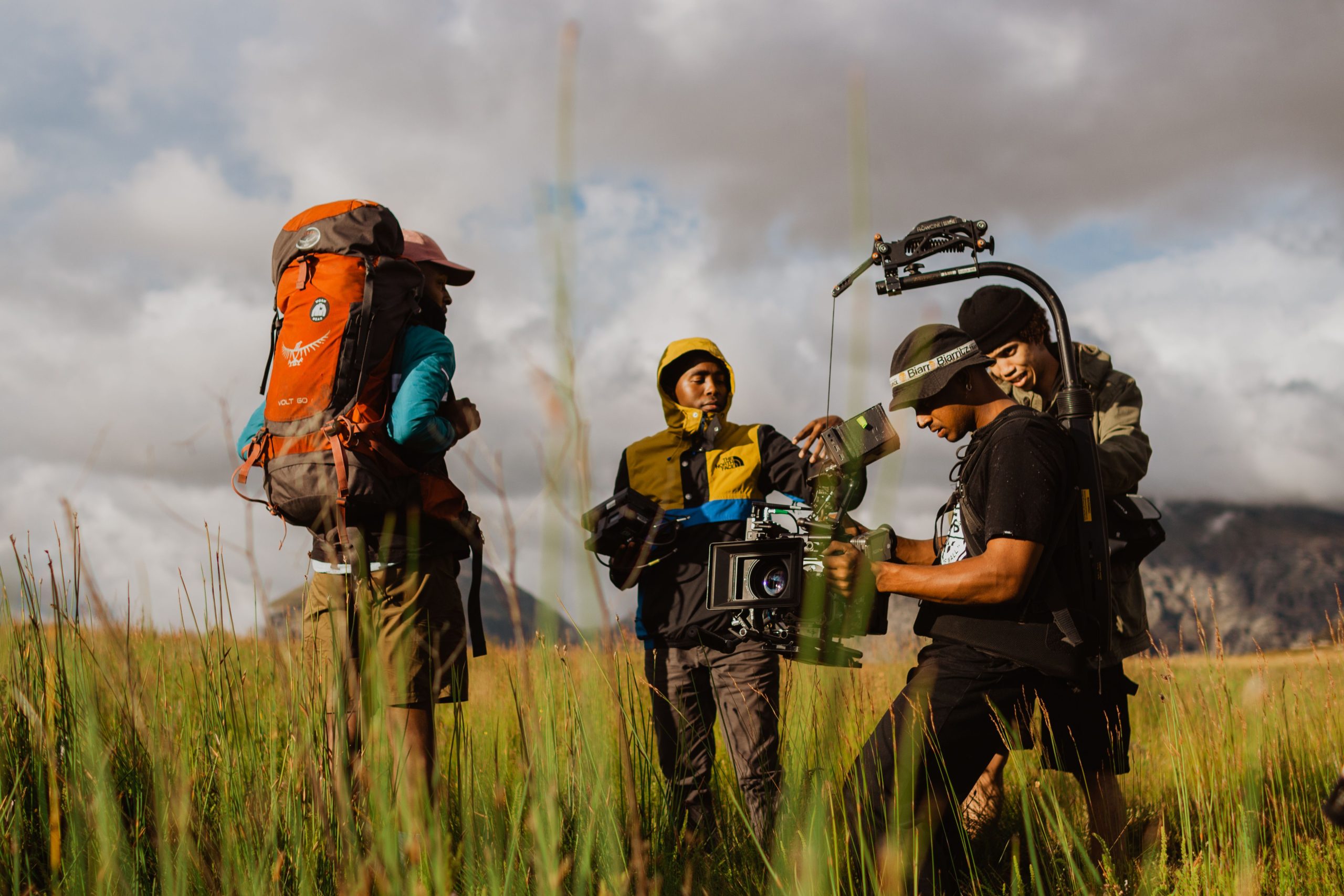
Saudi Film Festival Supports South African Filmmakers
South African Filmmakers Tebogo Malebogo and Petrus van Staden are at the Red Sea International Film Festival (RSIFF) with their project ‘Where is the healer?’. They sat down to speak to SAPeople. Tebogo and Peet, could you tell us a bit about yourselves and your backgrounds? Tebogo: I’m a South African filmmaker. I finished my matric […]

South African Filmmakers Tebogo Malebogo and Petrus van Staden are at the Red Sea International Film Festival (RSIFF) with their project ‘Where is the healer?’.
They sat down to speak to SAPeople.
Tebogo and Peet, could you tell us a bit about yourselves and your backgrounds?
Tebogo: I’m a South African filmmaker. I finished my matric and did my BA in film in South Africa. I was born in the UK and I lived in a few different countries before moving to South Africa. I currently live in New York because I’m in my third year of graduate film at Tisch.
Peet: I was born and raised in Mpumalanga, South Africa, and went to Cape Town for film school and that’s where Tebogo and I initially met. I originally trained and worked as an editor. Then we started trying to figure out what we wanted to do. I started self-learning producing. Tebogo picked up a lot of the producing aspects too. It’s great working with a director who’s also willing to get their hands dirty on the admin side. We have some blurred lines between us.
Will you continue mixing jobs and blurring the lines?
Peet: I don’t know. I feel like we might even mix it more. I edited our shorts. In the future we might co-edit a lot more. We see things very differently between the two of us. Tebogo always thinks really great out of the box, whereas I think really great within the box. I’m very stressed about rules. Tebogo’s like “No rules!”.
Where does the ‘No rules!’ mentality come from?
Tebogo: In my first year of film school I got in trouble for my film because they had all these very strict rules about who you can and can’t work with and not blurring lines between people’s roles. We’re all creatives, let’s just work together and trust people in that way. But everyone was like, “You can’t screen this film. It’s not within the rules. The head of film is going to come down on you”. I ended up screening the film and the head of film walked by me and he was like, “That was really, really good”, and he just left.
I think that was a great way to set the tone. I think you should know what is important for you while always making sure that people are safe and respected.
Peet, do you still keep your eye on the rules a bit?
Peet: Sometimes there’s a lot of money involved in making films and the structure kind of helps.
How did you first start working together?
Peet: We ran into each other about three years after we graduated, at a film event in Cape Town. Then in April 2019 we decided just to put all our savings together and make a short film, ‘Mthunzi’. We shot it a month later in Cape Town at my mom’s house. Low budget. Then finished it another month later, and then it got into Locarno, which was a pretty big deal for us. It was a great experience and we got an amazing team to come and help us.
Tebogo: Our lead actor, Nala Khumalo, is a really fantastic actor. He was in ‘Raised by Wolves’ and Jenna Bass’s ‘High Fantasy’. We had some really great other South African actors: Inge Beckmann, Jamie-Lee Money and also Russell Crous. We went to Switzerland together for our first festival. We were the only South African film. I think we were the youngest people there. That was a really fantastic experience. Then the film got invited to a few other places, Chicago and the New York Film Festival.
What can you tell us about the project that’s brought you to the RSIFF?
Tebogo: “Where is the Healer?” will be our first feature. We’re currently in the development phase of it, in research. We’re looking for coproducers and financiers. We’ve received a grant from the San Francisco Film Festival and we’ll be heading there to write the script.
We’re very excited about telling this story in the same vein that our shorts have been. It’s time for younger people to tell our own stories. It’s important to us that with all the movements of big streamers and companies coming into our country who are doing and making wonderful content, that we still have content that’s being made from South Africans within the country. I’ve been out of South Africa for two years now but when people ask I explain, “I’m just here at school so I can make contacts and grow our networks so we can make our films back home”.
Has it been alright juggling school and work?
Tebogo: It’s been a bit stressful at times. One of our films is on Mubi right now and I remember being in the back of my class trying to pay attention while I was reading over the contracts, like reading a contract for your film to be on a streamer while you’re in class about how to get your films onto streamers is a very surreal experience. So I think that’s a good example of trying to be in school while trying to have a career. But I received really great support. We made our second short film, ‘Heaven Reaches Down to Earth’ right before I left to New York.
What went into ‘Heaven Reaches Down to Earth’?
Peet: It was also self-funded but very different to our first short.
Tebogo: It was much more experimental, non linear. It was shot completely outside with a small crew. We received support from Panavision in South Africa. I would not have a career without them. They’re fantastic. Shout out Panavision Cape Town!
Peet: Thank you Philip Doble!
Tebogo: It had two really great actors, Thapelo Maropefela and Sizo Mahlangu, and we got to travel with that film as well. It got into Clermont-Ferrand. We screened at MoMA in New York and in Chicago.
Peet: It went to like over 50 international film festivals, won a couple of awards at least. I think 12 of them were Academy Award qualifying festivals, and then it got signed to Mubi, which is like one of the best arthouse streamers. So we were very excited when our distributor emailed us to say that Mubi got in touch!
Tebogo: It’s a real dream. They’ve been very kind to us, both our distributors and Mubi.
Spike Lee was at the RSIFF and promoted NYU Tisch, where he teaches, but also said young filmmakers can go anywhere and pick up a phone and start creating. How do you feel about the film journey in terms of education?
Tebogo: Well, it’s funny because Spike Lee is my teacher right now. We’re both not in class this week, so that’s pretty funny.
I think film school is a tool. There are bad ways to use tools, there are great ways to use tools and some people don’t need tools, right? If you go in knowing what you want and being open, it can be a very rewarding experience. It’s also important not to be afraid of completely experimenting and realizing who you are. It’s a very safe space.
I’ve shot without scripts. Spike Lee gave me a bit of grief for that but in a great way. He did like the film in the end. But I said, ‘Hey, I’m going to improve this one scene, you know, and just see how that goes. I’m going to cast non actors, we’re going to use film’.
Peet: You need to be honest with yourself on what kind of filmmaker you are and how you want to get there. Then just watch as many films as you can, old or new, whether you’re in film school or not. Know if you want to be a Hollywood filmmaker or an arthouse director and then start understanding what makes those films and find your own voice in that before you make the decision of whether you want to go to practical or theoretical film school. Just be honest with yourself.
Tebogo: It’s also important not to shy away from the conversation about money. I’m currently being supported by BAFTA and the Purin Foundation as I’m studying in the US, and I think that wouldn’t have been possible if I hadn’t made films leading up to it, because I use those to apply for financing and I’ve been putting myself through school. When we say that we’ve funded our films, we also work two part time jobs to be able to finance them and asked our parents for a little bit of money here and there.
Peet: We had two jobs at one time to fund our second film. I moonlighted freelancing at night while I was doing a full time job.
How has your experience at the Red Sea International Film Festival been?
Peet: I don’t think we’ve ever felt this supported as filmmakers. It’s been great, the support we’ve been given from the festival, flying us here, putting us up in a very nice hotel. It’s been great to feel like there is an institution out there actually caring about African filmmakers and the work that they’re trying to do.
Tebogo: Everyone has been very nice to us and it’s exciting to meet filmmakers that I had either seen their films and not met them or that I had no idea of at all but you meet them and they’re so talented and on the rise. It’s a great way to highlight filmmakers from the Middle East and Africa.
Thank you both.
This interview has been edited for length and clarity.
Tebogo Malebogo and Petrus Van Staden are the co-founders of Vanishing Elephant, a South African Production Company based in Cape Town.
